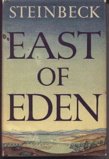 Today’s Splash du Jour has had me thinking about Steinbeck. I love his stuff.
Today’s Splash du Jour has had me thinking about Steinbeck. I love his stuff.My favorite of his novels, [thus far] has been East of Eden.
Steinbeck proposed four potential titles before he settled upon East of Eden. I looked up the phrase in the Bible and found that it appears twice in Genesis (3:24 and 4:16); both accounts denoting an instance where man allegedly experienced a separation from the blessings that God had intended for him.
I think this is very significant as we consider what Steinbeck was writing about in his allegorical novel. He says in Chapter 34, "We have only one story. All novels, all poetry are built on the never-ending contest in ourselves of good and evil. And it occurs to me that evil must constantly respawn, while good, while virtue, is immortal."
The contest is in ourselves!
Surely this is what East Of Eden quietly teaches us while we enjoy the sweeping story, so well told. It is deadly realistic, as beautiful and revolting as is the actual human potentiality for good and evil. With brilliance, Steinbeck contrasts a sea of temperaments in these characters, and shows us all the while that life is much more than the choices we make, but it is never any less.
Adam Trask is the representative of good intentions, of a conscience which responds to the good as the eye responds to the light. Samuel Hamilton also represents a similar (perhaps even more well-honed) goodness. But Adam is the one who has been deceived, by a force every bit as essentially evil as Eden's serpent in the tree. This force is Cathy, a character so reprobate that evil isn't something she does, it's something she is that infects everything she does! After abandoning her twin boys Caleb and Aron to the care of their father (Adam) she returns to her life of debauchery. The boys grow up unaware that their mother is a serial murderer and owner of a whorehouse.
Because Adam never fully recovers from his shame, his loss and disillusionment, he is not able to convey the appropriate unconditional (equally distributed) love to his sons. This leads to jealousy and rivalry in his boys, and is a generational replica of his own childhood.
How can one summarize such a vast epic story? But for me, one of the most powerful scenes and a turning point (perhaps the denouement?) is when Caleb finally sees his mother in all her non-glory, and says to her, "I don't have to be you." The reader can notice that really no-one is the same from this point on, there is a real unraveling here. For Cathy (now "Kate"), this marks the beginning of her own self-destruction, the awakening of her own conscience. She's been defied!
One of the tendencies of the modern age is to deny radically the absolute nature of conscience, reducing it to a matter of temperament, or to a product of history or social environment.
But East of Eden plows right through a tangle of sociological, psychological, and historical half-truths to the elementary fact: CONSCIENCE EXISTS.
***********
No comments:
Post a Comment